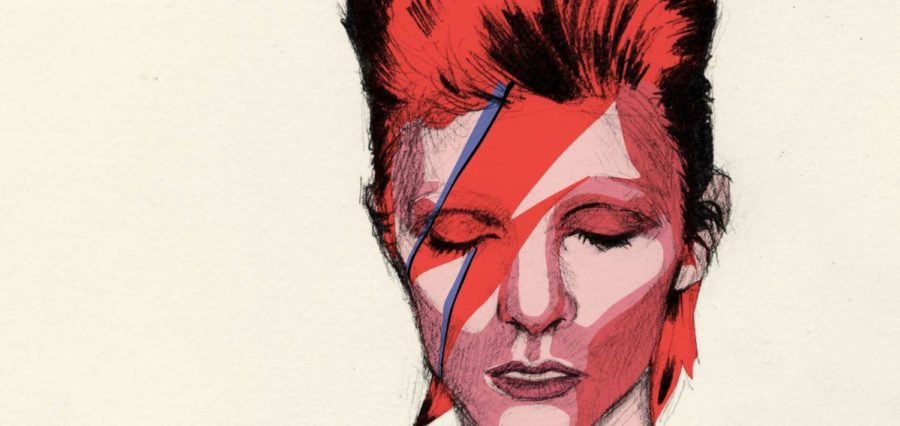Somewhere tucked away in an overcrowded CD cabinet, you’d find my parents’ copy of Aladdin Sane. Bowie fan or not, you’d likely recognize the red and blue lightning bolt streaked across his face. The album tells the story of David Bowie’s alter-ego Ziggy Stardust, a so-called alien messenger to Earth. Because Ziggy is a cultural icon representing sexual promiscuity and exploration, he was—undoubtedly—Bowie’s most celebrated and identifiable persona at the time (and probably even now). And then along came Major Tom. And Halloween Jack. And Elephant Man. These are Bowie’s different characters, personas, and incarnations, all of which tell different stories and contribute to Bowie’s enduring legacy as a creative artist.
After Bowie passed away following an 18-month-long battle with cancer, floods of people took to Facebook to honor the cultural icon. The fashion genius. The social commentator. The leader of a revolution. The rapist.
Legend. Icon. Leader.
But something’s missing…
rapist. Rapist. RAPIST.
All of these words define David Bowie, and we can’t understand who he was without considering all of them equally.
I’ve always had a problem separating an artist from his or her artwork: art is inherent to any artist’s identity. Woody Allen and Mia Farrow separated after 12 years together because she found he’d taken naked pictures of her then-19-year-old daughter. When his own daughter was seven years old, he sexually assaulted her. How can we, when we ask, “Which Woody Allen movie is your favorite?” separate Woody Allen’s work from his personal life? His movies are his creations, influenced by his own thoughts and ideas, which largely stem from his own experiences, actions, and behaviors. As I read through Sylvia Plath’s The Bell Jar, I couldn’t help but connect Esther Greenwood’s failed suicide attempts to Plath’s eventual real-life suicide. It’s impossible to look at a piece of art as though it exists in a vacuum, completely separated from the person who created it.
Simply put, an artist’s work is a representation of the artist. When you ask someone, “What’s your favorite Bowie song?” it’s nearly impossible to knock images of Ziggy out of your head. David Bowie embraced his identity as Ziggy Stardust—we as an audience accepted that fact. But David Bowie was also a rapist, something we are less eager to acknowledge.
Why are we uncomfortable with that fact? We love his art. We love the artist. We do not love a rapist. But the answer is not to stop listening to his songs or to disregard his lasting influence that extends far beyond the realm of music. It’s worth questioning why our idolatry takes precedence over our discomfort. Why are we so willing to overlook this heinous act? And not just him—our tendency to brush these terrible actions under the rug extends to other celebrities as well. Woody Allen’s daughter has been branded as mentally ill and accused of attempting to destroy her father’s well-earned fame. We can come up with logical explanations for a celebrity’s actions and are quick to suppress anyone who might tarnish their reputation. In some ways, we’re being kind—we want to believe the best of people, especially of the artists who inspire us. In the case of David Bowie, some feel that his actions are excusable because he did this a long time ago, and the girl recounts the time with supposed fondness. However, a 15-year-old child does not have the maturity to consent to a sexual experience with an adult man; this is a fact that Bowie took advantage of.
There’s the argument that bringing up this age-old scandal after Bowie’s death is disrespectful, but who do we really need to worry about disrespecting? What about the survivors of sexual assault who hear Bowie’s fans excusing his actions by saying, “It was only one time!” or “It was only one girl!” The kindness and compassion we extend to people like David Bowie, Woody Allen, and Michael Jackson should extend just as easily—if not more so—to their victims. Maybe we have to pay the price of feeling a little uncomfortable when watching The Cosby Show or listening to David Bowie’s music, but the victims have paid the higher price. We owe them the respect of recognizing their existence and their victimization at the hands of the artists we loved best. One assault is more than enough. We shouldn’t determine the degree to which we chastise or condemn someone—a rapist—based on the number of rapes they’ve committed. Rape is rape. Even for David Bowie.
Brooke White is a second-year in the College majoring in political science.








